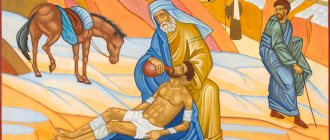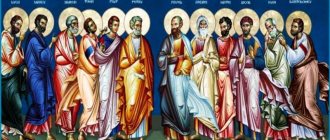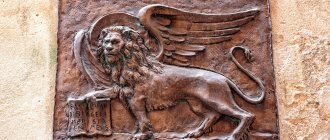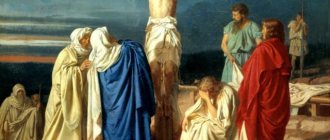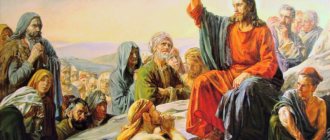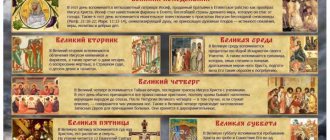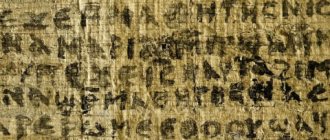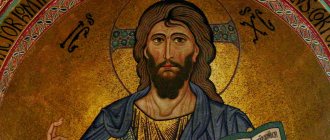Usually, wanting to emphasize the importance of something, we repeat it several times. It is the same in the Word of God: if something is repeated several times, it means that it is especially important and should be given special attention. One such passage that is repeated many times is the parable of the sower. Indeed, out of all four biographies of Jesus Christ, this parable appears three times. Therefore, let's explore it and see what especially important the Lord wants to teach us in this parable.
Parable
The Parable of the Sower is found in Matthew 13:1-8, Mark 4:1-9, and Luke 8:4-8. Let us take as a basis the account from Luke, where we read:
Luke 8:4-8 “When a great crowd had gathered, and the inhabitants of all the cities were coming to Him, He began to speak in a parable: A sower went out to sow his seed, and as he sowed, some fell by the wayside and was trampled, and the birds of the air devoured his; and some fell on a stone and, coming up, dried up, because it had no moisture; and some fell among the thorns, and the thorns grew and choked it; and some fell on good soil and sprang up and bore fruit a hundredfold. Having said this, he exclaimed: “Whoever has ears to hear, let him hear!”
The moment at which Jesus decided to tell this parable was not chosen by chance. Indeed, as it is said in the fourth verse: “When a great crowd was gathered, and the inhabitants of all the cities came together to Him, He [seeing that a great multitude was coming to Him - approx. author] began to speak in parables...” Jesus spoke this parable when many people came to Him to hear the Word of God. As we will see, the parable is about listening to the Word of God. Therefore, Jesus, in telling this parable, wanted everyone who came to Him to hear the Word to be aware of the choice they would be given.
Parable of the Servants Who Received Equal Pay (Matthew 20:1-16)
The Kingdom of Heaven is like the owner of a house, who went out early in the morning to hire workers for his vineyard, and, having agreed with the workers on a denarius per day, he sent them into his vineyard; going out about the third hour, he saw others standing idly in the marketplace, and he said to them, “Go you too into my vineyard, and whatever comes next I will give you.” They went. Coming out again around the sixth and ninth hours, he did the same. Finally, going out about the eleventh hour, he found others standing idly, and said to them: Why have you been standing here all day idly? They tell him: no one hired us. He says to them: You also go into my vineyard, and you will receive what follows.
When evening came, the lord of the vineyard said to his steward, Call the workers and give them their wages, beginning from the last to the first. And those who came about the eleventh hour received a denarius.
Those who came first thought that they would receive more, but they also received a denarius; and having received it, they began to murmur against the owner of the house and said: these last worked for one hour, and you made them equal to us, who endured the burden of the day and the heat. He answered and said to one of them: friend! I don't offend you; Did you not agree with me for a denarius? take yours and go; I want to give this last one the same as I gave you; Don't I have the power to do what I want? Or is your eye envious because I am kind?
So the last will be first, and the first last; For many are called, but few are chosen.
"On the Road"
Looking at the above passage from the Gospel of Luke, we can say that this parable is about a seed that falls into four different types of soil, the first of which was “by the wayside.” As Luke 8:5 says:
Luke 8:5 “…a sower went out to sow his seed, and as he sowed, some fell by the wayside and was trampled, and the birds of the air devoured it.”
One of the sown seeds fell “ON THE WAY” and therefore did not sprout and bear any fruit, but was trampled and eaten by birds.
The interpretation of this part of the parable is given a few verses below. So Luke 8:11-12 says:
Luke 8:11-12 “This is what this parable means: The seed is the word of God; and those who fell along the way are the ones who listen, to whom the devil then comes and takes away the word from their hearts, so that they do not believe and are saved.”
Also in Matthew 13:19, in the interpretation of the same part of the parable, it says: “...to everyone who hears the word of the kingdom and does not understand, the evil one comes and snatches away what is sown in his heart—this is what is sown by the wayside.”
According to the above passages, the seed that is sown is the WORD of GOD, or “the word of the kingdom.” However, this Word does not produce the same result everywhere, since its fruitfulness depends on the ground into which it falls. One possible type of soil is the land “by the road,” which, according to the interpretation of the parable, denotes people who, although they hear the Word of God, do not understand it. What is meant by the words “they do not understand” - we learn about this from the context of the parable. Thus, the Greek word translated “knowing” in the above passage is a derivative of the verb “suniemi,” which is used six times in Matthew 13, five of which are in relation to our parable. Thus, Matthew 13:13-15 says:
Matthew 13:13-15 “...Therefore I speak to them in parables, that seeing they do not see, and hearing they do not hear, and they do not understand [Greek: “suniemi” - approx. author], and it comes true over them [over those who seeing do not see and hearing does not understand - approx. author] the prophecy of Isaiah, which says: you will hear by hearing, but you will not understand [Greek: “suniemi” - approx. author], and you will look with your eyes and will not see, FOR [for this reason, although they hear, they do not understand. – approx. auth.] the hearts of these people have become coarse, and their ears are hard to hear, and they have closed their eyes, lest they see with their eyes, and hear with their ears, and do not understand [Greek: “suniemi” - approx. author] heart, and let them not turn so that I heal them.”
Such a person, although he hears the Word, does not understand it in his heart (the spirit of his mind). What is meant here in the parable of the sower is not a simple mental understanding of the Word. Rather, it is understanding, accepting the Word with all your heart, spirit of mind. Therefore, the result that the seed of the Word will bring will depend on the soil, on the hearts of those listening to the Word. The same seed falling into different soil, i.e. into qualitatively different hearts, gives different results. If the heart is hardened, then the seed of the Word of God will be like the seed that falls by the wayside. It will not sprout and, of course, will not bear fruit at all. As stated in 2 Corinthians 4:3-4 and Ephesians 4:17-19:
2 Corinthians 4:3-4 “But even if our gospel is veiled, it is veiled to those who are perishing, to those who do not believe, whose minds the god of this world has blinded, lest the light of the gospel of the glory of Christ, who is the image of the invisible God, should shine to them.”
And in Ephesians 4:17-19 “Therefore I speak and charge in the Lord, that you no longer walk as other nations walk in the vanity of their minds, being darkened in their understanding, alienated from the life of God, because of their ignorance and the hardness of their hearts. . Having reached the point of insensibility, they have given themselves over to debauchery in such a way that they commit all uncleanness with gluttony.”
There are people to whom the Word of God is “closed” and who cannot “understand” it, not because the Word of God is difficult to understand, but because their hearts have become hardened and hardened, preventing the seed of God’s Word from germinating.
Also, the Greek word translated “darkened” in the Ephesians passage is the word “porosis,” which means “insensibility.” The same word is used in Mark 3:5 to describe the hearts of a characteristic group of people who persecuted Jesus so much—the Pharisees:
Mark 3:5 “And [Jesus] looked at them [that is, at the Pharisees (see Mark 2:24) - approx. author] with anger, grieving over the hardness of their hearts [Greek: “porosis” - “insensitivity” - approx. author]..."
Next to the Pharisees was the Son of God Jesus Christ Himself!!! They heard and saw the greatest Teacher, the greatest who ever lived on earth. And yet they did not believe in Him. Why? Because their hearts have become hardened, i.e. were very rigid and unsuitable for the acceptance and growth of the seed of the Word. It was not the seed - the Word of God - that was to blame, but the EARTH, their hard hearts.
Chapter 2. Teaching in Parables / Sower
The Parable of the Sower is the first parable Jesus told in the Gospel of Mark. It is also the first independent parable in the Gospels of Matthew and Luke, except for the parable of the house on the rock and the house on the sand, interspersed in the Sermon on the Mount (in Luke - in the Sermon on the Plain), and the parable of the children on the street, interspersed in the sermon about John the Baptist. The presence of the parable of the sower in all three synoptics and the position it occupies in each of the three synoptic Gospels forces us to begin the analysis of Jesus' parables with it.
Matthew's version (Matt. 13:3–9) is virtually identical to Mark's version (Mark 4:3–9). Luke's version of the parable (Luke 8:5–8) is somewhat shorter. Here is a parable as told by Mark:
Behold, a sower went out to sow; and while he was sowing, it happened that some fell along the road, and birds flew in and devoured them. Some fell on a rocky place where there was little earth, and soon sprang up, because the earth was shallow; when the sun rose, it withered and, as if it had no root, withered away. Some fell among thorns, and the thorns grew, and choked the seed, and it did not bear fruit. And some fell on good soil and produced fruit, which sprang up and grew, and brought forth some thirty, some sixty, and some a hundred. And he said to them: He who has ears to hear, let him hear! (Mark 4:3–9).
Minor differences between the evangelists in the presentation of the parable concern the seed that fell along the road: in Matthew and Mark the birds pecked it out, but in Luke it was trampled, and the birds of the air pecked it out. The seed that fell on the rocky soil, according to Matthew and Mark, quickly sprang up because the earth had no depth, and when the sun rose, it withered; it dried up because it had no roots. In Luke, the seed, having sprouted, dried up because it had no moisture. What fell on fertile soil in Matthew and Mark brings thirty-, sixty-hundredfold fruit; in Luke the fruit is a hundredfold.
To understand the context in which the parable takes place, it is necessary to remember the meaning that such fundamental concepts as earth, seed and thorns had for Jesus' listeners. This meaning for a modern person is not always obvious, as a result of which the parable is perceived as an abstract narrative in which the narrator operates with abstract concepts that are far from life. Few residents of modern cities have seen at least once in their lives how a real sower scatters seeds on a real field. Sowing and harvesting have long become a mechanized process, and only people directly involved in agricultural work are familiar with it. If city dwellers know anything about the work of a sower, it is either from literary works or from Van Gogh’s paintings.
The word "land" (ארץ 'ereṣ) was sacred to the Israelite. Despite the difficult political situation, the Jews of Jesus' time continued to live in their land - the one that God promised to Abraham and his descendants (Gen. 12:1-7). The Jews once conquered this land with difficulty from other nations; they returned to it after a long stay in Egypt and forty years of wandering in the desert; then they returned to it a second time after the Babylonian captivity. It was the land of their fathers and homeland (Gen. 31:3; 48:21) to which the Jews were attached. They knew that the owner of their land was God Himself; they are only strangers and settlers in it (Lev. 25:23). They remembered that tilling the land was man's original calling (Gen. 2:5, 15). They also knew the direct relationship between obedience to God and how the earth would respond to human labor:
Fulfill My statutes, and keep My laws and fulfill them, and you will live peacefully on earth; and the land will yield its fruit, and you will eat your fill, and you will live peacefully on it... If you do not listen to Me and do not fulfill all these commandments... then I... will break your proud stubbornness, and I will make your heaven like iron and your earth yours is like copper; and your strength will be exhausted in vain, and your land will not yield its growth, and the trees of the land [of yours] will not yield their fruit... The bread that sustains man will I destroy from you; ten women will bake your bread in one oven and will give you the weight of your bread; you will eat and not be full (Lev. 25:18–19; 26:14, 18–20, 26).
The word "seed" is found only in Luke's version; in the Matthew and Mark versions the seed is not mentioned, but is implied. The concept of seed (Heb. זרע zera', Greek σπὲρμα) also had a rich semantic load. On the one hand, the seed is that by which the process of reproduction and reproduction in the plant world is carried out (Gen. 1:12). On the other hand, the term "seed" is applied to a person's specific descendant (Gen. 4:23; 21:12–13) and his descendants in general (Gen. 22:17–18). The people of Israel are a holy seed, which should not be mixed with the seed of foreigners (1 Ezra 9:2). In Second Temple Judaism, the image of the seed sometimes signified the remnant who would return to their land at the end of the captivity. 1 Wright N. T. Jesus and the Victory of God. P. 212.. This return in the Psalms is presented in the images of sowing and harvest: Bring back, O Lord, our captives, like streams at noon. Those who sow in tears will reap with joy. He who bears seeds weeping will return with joy, bearing his sheaves (Ps. 125:4-6). Thus, the seed is simultaneously a symbol of life, posterity and the entire people of Israel.
Thorns (Heb. קוץ qôṣ, Greek ἀκάνθαι) are first mentioned in the book of Genesis, in the words of God addressed to Adam after his fall: Cursed is the earth because of you; you will eat from it in sorrow all the days of your life; It will bring forth thorns and thistles for you (Gen. 3:17–18). The thorn in the Bible is both a symbol of suffering (its thorns cause pain), disappointment (it grows where no one planted it) and fruitless labor (it grows instead of those plants from which one expects to receive fruit).
When reading the parable, it is important to remember that Jesus operated with those concepts that had both everyday and religious meaning for His immediate listeners. However, if the everyday meaning of the concepts was obvious to everyone, then the symbolism that stood behind them should have been revealed differently for everyone.
It is no coincidence that all three weather forecasters end their presentation of the parable with the formula: He who has ears to hear, let him hear! (Matt. 13:9; Mark 4:9; Luke 8:8). The same formula concludes Luke’s interpretation of this parable (Luke 8:15), and Matthew’s interpretation of the parable of the tares (Matthew 13:43). It is also found repeatedly in Jesus’ direct speech in other situations (Matthew 11:15; 25:30; Mark 4:23; 7:16; Luke 14:35). The use of this formula was one of the characteristic features of Jesus' speech; in His mouth it had a multifunctional meaning. With it He completed His parables and their interpretations. Sometimes He used it outside the context of parables, but always at the end of a speech to emphasize the significance of what was said. This formula was pronounced in a louder voice than the teaching itself (as indicated by the word “declared” preceding it in Matthew 25:30 and Luke 8:8). In translations, the nature of the statement is emphasized with an exclamation mark.
What did this formula mean? Obviously, she referred to what we talked about above: to the idea that the meaning and content of Jesus' preaching, including His parables, are revealed only to those who “have ears.” Jesus accused his opponents of seeing not seeing, hearing not hearing, and not understanding. Following the prophet Isaiah (Isaiah 6:9-10), He spoke about how the hearts of these people have become hardened and their ears are hard to hear, and they have closed their eyes (Matthew 13:13-15). These words immediately follow the parable of the sower and serve as a direct interpretation of the formula that concludes this parable. They are part of the episode we discussed above, in which the disciples ask Jesus to explain to them the meaning of the parable of the sower, and Jesus responds by pointing out to them their privileged position: unlike “outsiders,” they are given the knowledge of the secrets of the Kingdom of God. This episode is followed by all three weather forecasters with an interpretation of the parable. The versions of Matthew and Luke are somewhat shorter than the version of Mark, but in general content and terminology they are almost the same:
The sower sows the word. Those sown by the way signify those in whom the word is sown, but to whom, when they hear, Satan immediately comes and snatches away the word sown in their hearts. In like manner, those sown on rocky ground signify those who, when they hear the word, immediately receive it with joy, but have no root in themselves and are fickle; then, when tribulation or persecution comes because of the word, they are immediately offended. Those sown among thorns mean those who hear the word, but in whom the cares of this world, the deceitfulness of wealth and other desires, entering into them, choke the word, and it becomes unfruitful. And what was sown on good soil means those who hear the word and receive it, and bear fruit, some thirty, some sixty, some a hundredfold (Mark 4:14-20).
Who is meant by the sower in the parable? Jesus does not mention this in His interpretation, starting right away with the seed. Apparently He assumes that the disciples know who he is talking about. However, when interpreting the parable of the tares, which is thematically related to the parable in question, Jesus will directly say that he who sows the good seed is the Son of Man (Matthew 13:37). By analogy, we can extend this interpretation to the parable of the sower: in it, Jesus talks about Himself, His teaching and how differently people perceive this teaching. The parable of the sower thus becomes a prelude to all the other parables of Jesus. It is no coincidence that it was spoken earlier than other parables and occupies first place in the teaching from the boat.
What word does the sower sow? Mark does not qualify this word in any way. However, in Matthew the sower sows the word about the Kingdom (Matthew 13:19), and in Luke it is said: the seed is the word of God (Luke 8:11). Clearly Jesus is referring to His message. The expression “the word about the Kingdom” refers to the call with which His preaching began: Repent, for the Kingdom of Heaven is at hand (Matthew 4:17). It also points to the content of many parables, which begin with questions: what shall we compare the Kingdom of God to? or by what parable shall we depict it? (Mark 4:30; Luke 13:18); or with answers to these questions: The kingdom of heaven is like a mustard seed... The kingdom of heaven is like leaven... The kingdom of heaven is like a treasure... The kingdom of heaven is like a merchant... The kingdom of heaven is like a net... (Matthew 13:31, 33, 44, 45, 47 ). The revelation of the concept of “Kingdom of Heaven”, or “Kingdom of God”, was, according to the weather forecasters, the main content of Jesus’ preaching from the first days of His public ministry. This sermon is the very word of God, which is a direct continuation of the Old Testament revelations of God through the prophets. Jesus' listeners were undoubtedly familiar with Isaiah's words:
My thoughts are not your thoughts, neither are your ways my ways, says the Lord. But as the heavens are higher than the earth, so are My ways higher than your ways, and My thoughts higher than your thoughts. Just as rain and snow descend from heaven and do not return there, but water the earth and make it capable of giving birth and growth, so that it gives seed to those who sow and bread to those who eat, so is My word, which proceeds from My mouth. , - it does not return to Me empty, but fulfills what I please, and accomplishes what I sent it for (Isa. 55: 8-11).
In this text there is no image of the sower, but there are images of the seed, the earth, and most importantly - the word of God coming from the mouth of God. In the Christian exegetical tradition, this “word” is firmly identified with the Word spoken of in the prologue of the Gospel of John (John 1:1–5), that is, with the Son of God, who originally abided with God and came to earth in the Person of Jesus Christ. This Word does not return to God void, but fulfills the will of the Father, who sent Him into the world: For I came down from heaven, not to do My will, but the will of the Father who sent Me (John 6:38).
The theme of the message, sounded in Isaiah, is the leitmotif of Jesus' sermon: He speaks of Himself as sent into the world by the Father, and of the Father as having sent Him. This theme is fully revealed in the parable of the sower:
The sower went out to sow his seed. How simple, so solemn the beginning! It means: the time for sowing has come, frosts and snows have prepared the land, the plowmen have plowed, spring has come, and the sower goes out to sow... The human race, through millennia of torment and suffering, wanderings and cries, has been loosened and prepared to receive the Divine seed of life-giving teaching; the prophets plowed the field of human souls, and Christ shone like spring after a long, icy winter, and like a sower went out to sow. Prophets are plowmen, and He is a sower. If the prophets sowed seeds here and there, then those seeds were not theirs, but borrowed from God. And Christ went out to sow His seed... A sower came out - but where did he come from and where? The Son of God emerged from the eternal bosom of His Father... He entered the human body in order to serve people as a Man... Human souls are His field... He left His monastery and came to His field to sow His seed2 Nicholas (Velimirovich), St. Creations. Book 2. pp. 327–328..
So, in the parable of the sower, Jesus is talking about Himself. This brings this parable closer to many other parables and teachings in which Jesus draws the listener's main attention to His person and His work. This style of preaching seemed unusual, which is especially clear from the Gospel of John, where Jesus constantly talks about Himself to the Jews, thereby causing them more and more irritation. The formula I am in this Gospel is found more often than the expression the kingdom of heaven is like... among the weather forecasters (John 6:35, 41, 48, 51; 8:58; 10:9, 11, 14; 11:25; 14:6; 15:1, 5). Such frequent use of this formula with the attached images of the bread of life, the door for the sheep, the good shepherd, the vine, the way, the truth, the life and the resurrection testifies to the fact that the whole preaching of Jesus was primarily a self-revelation of His personality.
The fact that Jesus' preaching focused on His own person is due to His unique role as the Messenger and Son of God, who came to proclaim the will of God to people in a special way - not in the same way as the prophets did. They served only as transmission links between God and people, but Jesus was God incarnate and, speaking to people on His own behalf, at the same time spoke on behalf of God the Father. That is why He focused the attention of the listeners not on some individual aspects of His teaching and not on the teaching as a whole, but to an even greater extent on Himself as the source of this teaching.
Parallels to the parable of the sower can be seen in several places from the 3rd book of Ezra. In this book, God addresses the following words to Ezra: Just as a farmer sows many seeds on the earth and plants many plants, but not all that is sown will survive over time, and not all that is planted will take root, so those who are sown in this age will not all be saved. Ezra, in turn, answers: Just as the seed of a farmer, if it does not sprout, or does not receive Your rain in time, or is damaged by the abundance of rain, perishes: so also man, created by Your hands, and You are called his archetype, because You are like to him, for whom you created everything and whom you likened to the seed of the farmer (3 Ezra 8:41-44).
In another dialogue, God appears in the form of a sower, and His law in the form of sowing: Behold, I sow My law in you, and it will bring forth fruit in you, and you will be glorified in it forever. To these words of God, Ezra responds: But our fathers, having received the law, did not fulfill it and did not keep Your decrees, and although the fruit of Your law did not perish and could not perish, because it was Yours, yet those who accepted the law perished, not preserving what in it was sown... We who accepted the law, sinning, perished, and so did our heart, which accepted it; but the law did not perish and remains in force (3 Ezra 9:31–33, 36–37).
The question of whether Jesus knew the 3rd book of Ezra can be put aside. The 33rd book of Ezra is an Old Testament apocrypha, preserved only in translations into Latin, Syriac, Ethiopic, Arabic and Armenian. Part of this apocrypha (chapters 1–2 and 14–16) appears to have been created already in the Christian era, while the main part (chapters 3–13) dates back to pre-Christian times. There is no evidence that she was known to Jesus. In the II century. the book was referred to by Clement of Alexandria (Stromata. 3, 16. Russian translation: T. 1. P. 448). Even if He knew it or the material on which it is based, it is hardly possible to interpret His use of images of seed and sowing in terms of literary dependence. Jesus was not an armchair scientist who learned about life from books. He knew the Holy Scriptures of the Old Testament very well, and many of the images He used have direct parallels in it. At the same time, observations of the life of ordinary Galilean peasants were no less important for His preaching. Telling His listeners about the sower, the soil, the seeds, the shoots, He appealed not to literary sources, but to what happened before His eyes and what was known to everyone - known not from books, but from experience or from his own observations.
The image of the sower is often associated with the messianic and eschatological expectations characteristic of Jesus' contemporaries. The messianic character of the parable is emphasized by the comment that Jesus, according to all three synoptics, accompanies it in his conversation with his disciples: It has been given to you to know the secrets of the Kingdom of Heaven (Matthew 13:11; Mark 4:11; Luke 8:10). Matthew expands this commentary to include words not found in Mark: Blessed are your eyes that they see, and your ears that they hear: for verily I say unto you, that many prophets and righteous men desired to see what you see, and saw not, and to hear what you hear and have not heard (Matthew 13:16–17). Luke gives similar words elsewhere (Luke 10:23–24). What Jesus says and does is presented in this commentary as a direct fulfillment of the desires of the Old Testament prophets. In this context, the image of the sower is especially appropriate.
However, the seed He scatters falls on different soils. Jesus divides his listeners, whom the parable depicts, into four categories. The reaction of people classified in the first, second and third categories differs from each other only in process, but not in result: none of the three categories includes people who bear the expected fruits. Only the fourth category includes those who bear fruit: it is opposed to the other three.
The first category includes those from whom the enemy steals the word they hear. In conveying the words of Jesus, Matthew designates this enemy with the term “evil one,” Mark speaks of him as Satan, Luke calls him the devil. Three terms denote the same character in biblical and gospel history, who constantly, starting from the first pages of the book of Genesis, opposes the will of God (Gen. 3:1–5). Acting within the boundaries God has set for him (Job 1:6-12; 2:1-6), he nevertheless always tries to go beyond these boundaries and enter into direct contact and conflict with God.
The devil is the tempter. All three Synoptic Gospels contain a story about the temptation of Jesus by the devil in the desert before His going out to preach (Matthew 4:1–11; Mark 1:12–13; Luke 4:1–13). The subsequent gospel narrative, which includes numerous cases of demons being cast out from those possessed, presents a picture of Jesus’ continuous struggle with demonic forces, led by the devil.
In His teachings, Jesus repeatedly speaks about this character, calling him now the enemy, now the devil, now the evil one, now Satan, now Beelzebub, the prince of demons. He does not deny the power of the devil, but speaks of Himself as stronger: When a strong man guards his house with weapons, then his property is safe; when his strongest attacks him and defeats him, then he will take all his weapons in which he hoped and divide what was stolen from him (Luke 11:21-22). The evil one is a dangerous adversary, so the disciples are encouraged to pray that God will deliver them from him (Matt. 6:13).
In the parable of the sower, the action of the devil is the first reason why a person may not respond to the word of God. Its action is conveyed in the Matthew version by the verb ἁρπάζω (“kidnap”, “steal”, “take away”), in the version of Mark and Luke by the verb αἴρω (here “to take”, “to select”). God gives man His word as a gift, but the devil lies in wait for man in order to take this gift away from him, to steal it. The lightning speed with which the devil steals the seed of the word of God from a person is symbolized by the image of birds flying onto the seeds and quickly pecking them off.
The second category is those who willingly respond to the word and accept it with joy, but do not have a root in themselves and are fickle: when tribulation and persecution come, they are tempted because of the word. So in Mark's version. In Matthew's version the same image is given in the singular. In Luke, persons belonging to this category believe for a time, but during temptation they fall away. The difference between the versions of Matthew and Mark on the one hand, and Luke on the other, is due to the use of the same expression in different meanings: the word πρόσκαιρος in Matthew is a definition and means “fickle” (in Mark it is also given in the plural), in Luke πρὸς καιρόν is written separately and means “for some time” (“at times”, in the Synodal translation - “time”).
The term “temptation” in Luke may indicate a connection between the second category of listeners and the first, since the tempter, as a rule, is the devil. In Matthew and Mark, the expression “persecution because of the word” indicates the persecution that Christians will be subjected to. The mention of persecution is one of the reasons why many scholars, starting with A. Jülicher, considered the interpretation of this parable to be a product of the creativity of the early Christian Church, and not an authentic interpretation of Jesus4See: Jülicher A. Die Gleichnisreden Jesu. Bd. II. S. 524–538; Dodd CH The Parables of the Kingdom. P. 145..
Meanwhile, Jesus repeatedly warned His disciples that persecution awaited them: both in the Sermon on the Mount (Matthew 5:10–12), and in the instruction of the twelve after the election (Matthew 10:16–23, 28), and in the instruction , pronounced two days before the last Passover (Matthew 24:9). If all these references to persecution are later insertions, then much of the direct speech of Jesus in the Synoptic Gospels turns out to be a forgery, a later counterfeit product. We categorically disagree with this approach.
The word “root” should be considered key to understanding this text: it is the absence of a root that causes the falling away (according to Luke) or the temptation (according to Matthew and Mark) of those who belong to this category. By the root, apparently, we must understand faith: this is indicated by the contrast between faith and falling away in Luke’s version (by falling away, of course, is meant a falling away from faith).
It is also possible that the image of a quickly sprouting plant and its lack of roots indicates two different types of religiosity: external and superficial on the one hand, internal and deep on the other. External religiosity presupposes a person’s readiness to fulfill a certain amount of spiritual and moral prescriptions and rituals without a deep understanding of their meaning (the ground on which in this case the seed fell, according to the version of Matthew and Mark, “had no depth”). Internal religiosity, on the contrary, may be invisible to an outside observer, like a root in the ground, but only such religiosity can give a person the strength to endure persecution, trials and temptations.
The verb “tempted” (σκανδαλίζονται), applied to persons of the category under consideration, comes from the term “temptation” (σκάνδαλον), which has a diverse semantic spectrum in the early Christian tradition. On the one hand, temptation is something that must be decisively rejected: If your right eye offends you, pluck it out and throw it away from you, for it is better for you that one of your members should perish, and not that your whole body should be thrown into Gehenna. And if your right hand causes you to sin, cut it off and throw it away from you, for it is better for you that one of your members should perish, and not that your whole body should be cast into hell (Matthew 5:29-30). On the other hand, the very activity of Jesus can become a source of temptation: Blessed is he who is not offended by Me (Matthew 11:6). The Apostle Paul directly says that the crucified Christ is a stumbling block for the Jews and foolishness for the Greeks (1 Cor. 1:23).
In this context, one should understand the warning that sounds in the parable of the sower: those who perceive in the word of Jesus only its outer side, only its beautiful shell, but do not realize its inner depth, at some stage of life under the influence of external circumstances (tribulation , persecution or temptation) may be tempted and fall away.
The third category of persons spoken of in the parable are those in whom, according to Matthew and Mark, the worries of this age and the deceitfulness of wealth choke (συμπνίγουσιν) the word, and it remains unfruitful (ἄκαρπος). According to Luke's version, these people listen to the word, but, leaving, they are overwhelmed by worries, wealth and the pleasures of life (συμπνίγονται) and do not bear fruit. These words must be understood in the general context of Jesus' teaching on cares, wealth and worldly pleasures.
The theme of wealth comes up constantly in Jesus' preaching, and the term "wealth" in His mouth always has a negative connotation. After meeting the rich young man, Jesus exclaims: How difficult it is for those who have wealth to enter the Kingdom of God! The disciples are horrified by these words, but He repeats: Children! How difficult it is for those who hope for wealth to enter the Kingdom of God! (Mark 10:23–24). In the Sermon on the Mount, Jesus says: You cannot serve God and mammon (Matthew 6:24). And in the Sermon on the Plain he addresses the rich with a formidable admonition: Woe to you, you rich! for you have already received your consolation (Luke 6:24). The parable of the rich man and Lazarus is dedicated to the theme of wealth and poverty, in which the rich man ends up in hell after death (Luke 16:23).
It is characteristic that, according to the versions of Matthew and Mark, Jesus in the parable of the sower speaks of the deceitfulness of wealth. The word ἀπάτη in classical Greek indicates deception, lies, disappointment, unfulfilled hopes. The deceitfulness of earthly acquisitions is emphasized by the parable of a rich man who had collected such a harvest that he had nowhere to put it, and who said to himself: Soul! you have a lot of good things lying around for many years: rest, eat, drink, be merry. Jesus calls this man crazy (Luke 12:15–20).
The term "cares" also has a negative connotation in the mouth of Jesus. An entire section of the Sermon on the Mount is devoted to calls not to worry about clothing, food and drink, and not to worry about tomorrow. Examples are given of the birds of the air and the lilies of the field, which God Himself cares for. The Kingdom of God and its truth are contrasted with earthly concerns: the followers of Jesus are called to seek this Kingdom first of all, and what they need in earthly life will be added by itself (Matthew 6:25–34). In the parable of the sower, the symbol of worldly cares is the thorn (ἀκάνθαι) - a thorny plant that springs up and drowns out the ear of wheat.
So, Jesus gives three main reasons why the word of God may not bear fruit in certain people: the action of the devil; the inconstancy of man himself and the absence of a root in him; the wealth and cares of this age (according to Luke - also worldly pleasures).
These three categories of listeners are contrasted with the fourth - those who not only hear the word, but also understand it and bear fruit (according to Matthew); accept and bear fruit (according to Mark); They keep it in a good and pure heart and bear fruit with patience (according to Luke). Common to all three versions is the verb καρποφορέω (lit. “to bear fruit”): this verb indicates the positive result expected from the work of the sower.
The heart referred to in Luke's version is designated by two terms: καλὴ καὶ ἀγαθή (literally: “beautiful and good,” “beautiful and good”). Commentators point out that these two terms were used in Greek philosophy to denote the ideal combination in a person of physical beauty and high moral qualities5 Fitzmyer JA The Gospel according to Luke (I–IX). P. 714.. It is unlikely, however, that one can see in this anything more than a verbal coincidence, especially considering that in the original the parable was spoken in Aramaic.
One should not look for an allegorical meaning in the indication of thirty-, sixty-hundredfold fruit. In this case, the numbers most likely symbolize the abundance of fruit that the word of God brings to those who accept it with faith. They can also indicate different degrees of spiritual perfection achieved by those who believe and accept the word. This is how John Chrysostom understands this passage:
In His mercy, He not only showed the way and did not say that he would be alienated who did not bear fruit a hundredfold; He says, the one who bears fruit sixty times, and even the one who bears thirty, will be saved. This is why He said it, to make the path to salvation easier for us. So... can't give up your wealth completely? Give a portion of your wealth. Is it difficult and a burden for you? Share your property with Christ6 John Chrysostom. Interpretation of Saint Matthew the Evangelist. 45, 2 (PG 58, 474). Rus. transl.: P. 478..
Despite the inevitable side effect that some of the seeds die, the sower's activity ultimately achieves its goal: the seed that falls on good soil bears abundant fruit. What does this conclusion mean about Jesus and His mission? What He indicated elsewhere with the formula: many are called, but few are chosen (Matt. 20:16; 22:14; Luke 14:24). His mission will inevitably end in victory, but not everyone will be able to share the fruits of this victory with Him, but only those who believed in Him and followed Him.
In speaking the parable of the sower, Jesus spoke primarily about Himself and His contemporaries - those who listened to His preaching, but responded to it differently. If we consider this parable in a number of other parables, which imply the people of Israel and, in general, their reaction to the preaching of Jesus (this is evidenced, in particular, by the parable of the evil vinedressers in Matthew 21: 35–41; Mark 12:1–9 ; Luke 20:9–16), then it can be argued that the fertile land does not mean the Israeli people, but those peoples who believe in Jesus. This is exactly how the parable was perceived in the early Church. Justin the Philosopher, speaking about the rejection of the Messiah by the people of Israel, refers to the parable of the sower and insists on the Christian’s duty to preach “in the hope of finding good land somewhere.”7 Justin the Philosopher. Dialogue with Tryphon the Jew. 125 (PG 6, 765). Rus. trans.: P. 334.. This refers to the land outside of Israel and the sermon is not for representatives of the Jewish people.
While directly related to the history of Israel, the parable at the same time has a universal meaning. The sowing that Jesus began during his lifetime was continued by the disciples after His death and resurrection, and then by subsequent generations of Christian teachers. The word of God did not always fall on good soil. But where this happened, it sprouted abundantly. Entire nations were enlightened by the light of the gospel faith thanks to preaching - the same sowers who labored in preaching the Gospel and did not know whether their work would bear fruit, and if so, what kind.
The parables of Jesus come true in the history of many nations. For centuries, the Russian land has been that good soil into which the seed of the word of God fell and produced abundant fruit in the person of saints - noble princes, saints, saints, martyrs, Christ for the sake of fools. This land was called Holy Russia, because the ideal of holiness penetrated so deeply into the consciousness of Russian people that it seemed that he could no longer imagine himself without Christ and His Church. But when the persecution came, the situation changed dramatically. Millions of people took the path of confession, but some renounced faith and Christ. These were those of whom Jesus said that they had no root in themselves: while the time is favorable, they believe, but when persecution comes, they are offended and fall away.
Similar parallels could be drawn in relation to many other peoples, in whose lives the parable of the sower is actualized at different stages of their historical development. However, in contrast to the situation described in the parable, the same soil can turn out to be either good or rocky at different times, and a seed that falls into the same soil can sometimes be pecked by birds or drowned out by thorns, and in other cases it, contrary to all evidence, can bear a hundredfold fruit.
The same is true for individuals. The soul of one and the same person at different times can be good soil or rocky, and the seed, falling into his heart, can sometimes bear abundant fruit, and sometimes be drowned out by the thorns of worries or kidnapped by the devil.
There is one significant difference between the situation described in the parable and the reality that the parable symbolizes. The earth is good or rocky in nature: the quality of the earth does not depend on the earth itself. With regard to people, the situation is different: they cannot by nature be immune to the word of God. According to Chrysostom,
a stone cannot become earth, and a road cannot become a road, and a thorn cannot become a thorn; but this is not the case with intelligent beings. And the stone can change and become fertile earth; and the road may not be open to everyone passing by and not trampled under his feet, but a fat field; and the thorns may be cut off, and the seeds may grow without hindrance. If this were impossible, Christ would not have sowed. If such a change did not occur in everyone, then the reason for this was not the sower, but those who did not want to change8 John Chrysostom. Interpretation of Saint Matthew the Evangelist. 44, 3 (PG 57, 468). Rus. transl.: P. 467..
God created every person to be able to receive His word, and everyone's heart in its original, pristine state is good soil. There is no such person who would be deliberately excluded from the sphere of influence of God and His Good News. But people react to this news differently. It is precisely this different reaction that causes the fact that in one person God’s message bears a hundredfold fruit, in another sixtyfold, in a third thirtyfold, and in another it bears no fruit at all.
Chapter 2. Teaching in parables
Table of contents
Wheat and tares
“Others fell on rocky places”
Having considered the first kind of soil into which the seed of the Word of God falls, let us now come to the second. About him Matthew 13:5-6 says:
Matthew 13:5-6 “...other [seed] fell on rocky places where there was little soil, and quickly sprang up, because the soil was shallow. When the sun rose, it withered and, as if it had no root, withered away.”
The seed can germinate in different types of soil. But not all of them will survive and bear fruit. One of the soils is one in which a seed that, although it sprouted initially, ultimately failed to take root because it was in rocky ground. The reason why the seed did not take root is that the stones do not allow it to take deep roots, which is necessary to find moisture. Therefore, as soon as the wind blows, it dries up.
Turning to the Gospel of Mark to interpret this part of the parable, we read:
Mark 4:16-17 “In the same way those who were sown on rocky [places] are those who, when they hear the word, immediately receive it with joy, but have no root in themselves and are fickle; then, when tribulation or persecution comes because of the word, they are immediately offended.”
As we can see, rocky ground is represented by people who hear the Word of God and immediately accept it, even joyfully. However, this is not for long, for when tribulation and persecution arise, such people just as quickly fall away. It is obvious that the problem, which ultimately causes them to fall away, is that they are very weak in tribulation and persecution. Therefore, when the devil arranges such events against them, they immediately fall away. The reason they fell away was not because the tribulation was too much for them to bear, for 2 Corinthians 4:17, 1 Corinthians 10:12-13, and 1 Peter 5:10 tell us that when we are tempted, there will also be a way for us to escape, so that we can transfer (1 Corinthians 10:12-13). The reason is that they do not want to offer even the slightest resistance to the devil (as this passage says: they are “immediately offended”). James 4:7 says:
James 4:7 “Submit yourselves therefore to God; resist the devil, and [as a result of your opposition - approx. author] will run away from you.”
Also, 1 Peter 5:8-9 says, “Be sober and watchful, for your adversary the devil prowls around like a roaring lion, looking for someone to devour. Resist him with firm faith, knowing that the same sufferings happen to your brothers in the world.”
If we do not resist the devil, he will not escape from us. In other words, he consumes those who do not oppose him. People with hard hearts are also potential targets for the devil. When the devil comes and brings sorrows, they immediately become easy prey for him. They start well, but unfortunately end poorly.
Parable of the Ten Virgins (Matt 25:1-13)
The Kingdom of Heaven will be like the ten virgins, who took their lamps and went out to meet the bridegroom. Of these, five were wise and five were foolish. The foolish ones took their lamps and took no oil with them. The wise, together with their lamps, took oil in their vessels. And as the groom slowed down, everyone dozed off and fell asleep. But at midnight a cry was heard: behold, the groom is coming, go out to meet him. Then all the virgins stood up and trimmed their lamps.
But the foolish said to the wise, Give us your oil, for our lamps are going out. And the wise answered: so that there is no shortage for both us and you, you better go to those who sell and buy for yourself.
And when they went to buy, the bridegroom came, and they that were ready went in with him to the wedding, and the door was shut; Afterwards the other virgins came and said: Lord! God! open to us. He answered and said to them, “Truly I say to you, I do not know you.”
Watch therefore, for you know neither the day nor the hour in which the Son of Man will come.
Third category
Having examined the first two categories of people who hear the Word, let us now move on to the third. Mark 4:7 says:
Mark 4:7 “Some fell among the thorns, and the thorns grew and choked [the seed], and it did not bear fruit.”
The third type of soil into which the seed falls is thorny ground. The grain, falling into such soil, is choked by thorns and, therefore, does not bear fruit. To understand what is meant in this part of the parable, let's move on to Mark 4:18-19, where it is written:
“Those sown among thorns are those who hear the word, but in whom the cares of this world, the deceitfulness of riches, and other desires enter into them and choke the word, and it becomes unfruitful.”
Unfortunately, this third category of people is also not prosperous. The problem with these people is that the Word of God coexists in their hearts with the worries of this age, the deceitfulness of wealth and other desires.” Ultimately, these all become thorns that hinder the growth of the Word of God, choking it and rendering it unfruitful. In contrast to what this category of people do, Jesus said:
Matthew 6:25-34 “Therefore I say to you, do not worry about your life, what you will eat or what you will drink, nor about your body, what you will wear. Is not the life more than food, and the body than clothing? Look at the birds of the air: they neither sow nor reap, nor gather into barns; and your Father in heaven feeds them. Aren't you much better than them? And which of you, by caring, can add one cubit to his height? And why do you care about clothes? Look at the lilies of the field, how they grow: they neither toil nor spin; but I tell you that Solomon in all his glory was not dressed like any of them; But if God clothes the grass of the field, which is here today and tomorrow is thrown into the oven, then God will clothe it more than you, O you of little faith! So do not worry and say, “What shall we eat?” or what to drink? or what to wear? because the pagans seek all this, and because your Heavenly Father knows that you need all this. Seek first the Kingdom of God and His righteousness, and all these things will be added to you. So do not worry about tomorrow, for tomorrow [itself] will worry about its own things: enough for [every] day is its own worry.”
First of all - the affairs of the Kingdom of God, and then - everything else. If we apply this principle, then everything else will follow. However, if we do not apply it and put concerns and everything else that seems important to us first, this will lead to the fact that the Word will not be able to grow and bear fruit.
The series of worries of this world, the seduction of wealth and other desires are very serious. In the article Parable of the Sower: “What was sown among thorns...” this issue is discussed separately.
Parable of the Tares (Matthew 13:24-30)
The Kingdom of Heaven is like a man who sowed good seed in his field; while the people were sleeping, his enemy came and sowed tares among the wheat and went away; When the greenery sprang up and the fruit appeared, then the tares also appeared. Having come, the servants of the householder said to him: Master! did you not sow good seed in your field? where does the tares come from? He said to them, “The enemy man has done this.” And the slaves said to him: Do you want us to go and choose them? But he said: no - so that when you choose the tares, you do not pull out the wheat along with them, leave both to grow together until the harvest; and at the time of harvest I will say to the reapers, Gather first the tares and bind them in sheaves to burn them, and put the wheat into my barn.
"Others fell on good ground"
Coming to this point, we have already looked at three types of soil into which the seed of the Word of God fell. Unfortunately, it could not bear fruit in any of the soils. Thus, the first soil, which was “by the road,” was so hard that the seed could not even sprout. The second was also rocky, in which it was impossible for the seed to take deep roots. And finally, the third was thorny, choking the seed so that it could not bear fruit. Now that we have looked at these three categories that do not bear fruit, it is time for us to look at the GOOD soil that bears fruit. Matthew 13:8 says about her:
Matthew 13:8 “Some fell on good ground and brought forth fruit: some a hundredfold, some sixtyfold, and some thirtyfold.”
And here, in Matthew 13:23, the interpretation is given: “What is sown on good soil is he who hears the word and understands [Greek: “suniemi” - approx. auth.], which is fruitful, so that some bear fruit a hundred times, some sixty, and others thirty.”
This time the seed fell not along the road, not on rocky ground and not among thorns, but on good soil, in the hearts of people who listen to the Word and understand [Greek: “suniemi”] it. Luke 8:15 explains who “those who understand him” are:
Luke 8:15 “And those that fell on the good ground are those who, having heard the word, keep it in a good and pure heart and bear fruit with patience...”
As we may remember, people from the first category could not “understand” or accept the Word, since their hearts had become coarse and hard. People belonging to the fourth category, on the contrary, understand the Word, placing it in their good and pure hearts. People in this category have everything that the other three categories that do not bear fruit do not have. If people in the first category had rough and hard hearts, then here the hearts are kind and pure. People from the second category were unable to endure difficulties and immediately fell away at the first tribulations, but people in this category are patient (they “bear fruit in patience,” as this passage says) and do not give up. Finally, if in the third category the Word of God was drowned out by various concerns and wishes that took first place in life, here the Word is KEPT in the hearts of people, continuing to be the main priority. This category bears fruit. As Christ said in John 15:
John 15:1-2, 4-5, 8, 16 “I am the true vine, and My Father is the vinedresser. Every branch of Me that does not bear fruit He cuts off; and every one that bears fruit he purifies, that she may bear more fruit... Abide in Me, and I in you. Just as a branch cannot bear fruit by itself unless it is in the vine, so neither can you unless you are in Me. I am the vine, and you are the branches; He who abides in Me, and I in him, bears much fruit; for without Me you can do nothing... By this will My Father be glorified, if you bear much fruit and become My disciples... You did not choose Me, but I chose you and appointed you, that you should go and bear fruit, and that your fruit should remain, so that “Whatever you ask from the Father in My name, He has given you.”
God purifies every branch that bears fruit so that it can bear more fruit. The more fruit it bears, the more the Lord is glorified.
Parable of those invited to the wedding feast (Matthew 22:2-14)
The kingdom of heaven is like a man king, who held a wedding feast for his son and sent his servants to call those who were invited to the wedding feast; and didn't want to come.
Again he sent other slaves, saying: Tell those who are invited: Behold, I have prepared my dinner, my bullocks and what is fattened, slaughtered, and everything is ready; come to the wedding feast. But they despised this and went, some to their field, and some to their trade; the others, seizing his slaves, insulted and killed them. Hearing about this, the king became angry and, sending his troops, destroyed their killers and burned their city. Then he says to his servants: The wedding feast is ready, but those who were invited were not worthy.
So go to the highways and invite everyone you find to the wedding feast. And those slaves, going out onto the roads, gathered everyone they found, both evil and good; and the wedding feast was filled with those reclining. The king, entering to look at those reclining, saw a man there, not dressed in wedding clothes, and said to him: friend! How did you come here not wearing wedding clothes? He was silent. Then the king said to the servants: Having tied his hands and feet, take him and throw him into outer darkness; there will be weeping and gnashing of teeth; For many are called, but few are chosen.
